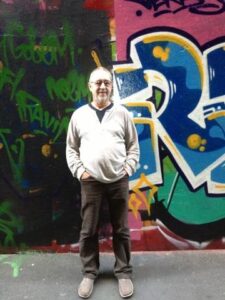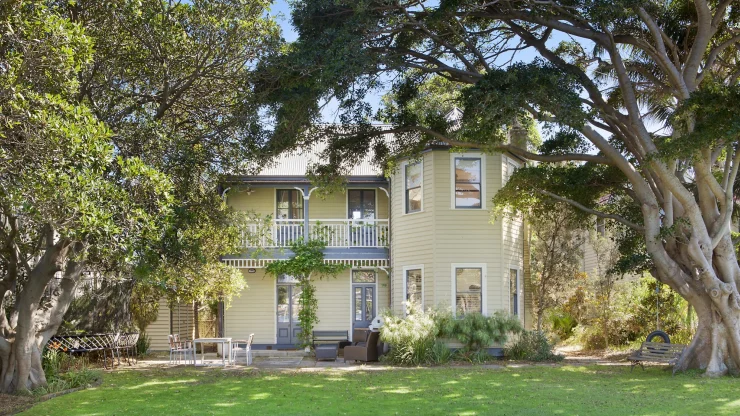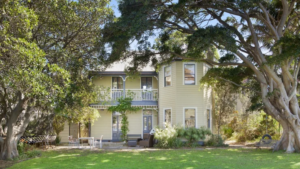by Bill Holloway
 For the last year or two Christina Stead, one of our finest novelists, has been in our too-hard basket. But now Whispering Gums and I are going to make a start on her work by reviewing some of the stories from the collection Ocean of Story.
For the last year or two Christina Stead, one of our finest novelists, has been in our too-hard basket. But now Whispering Gums and I are going to make a start on her work by reviewing some of the stories from the collection Ocean of Story.
Christina Stead (1902-1983) was Sydney born and bred, yet another famous alumna of Sydney Girls High, who starved herself saving for her fare overseas – fictionalized in For Love Alone – and who once overseas was prevented from coming back until she was quite old, by poverty and by our governments’ antipathy to her Communism.
Her father, David Stead (1877-1957), a zoologist, was head of Fisheries, in the NSW Public Service. Although her US publishers made Stead situate The Man Who Loved Children in America, it was largely based on her father and their homelife in Watsons Bay.
Ocean of Story is broken into sections by period and subject and the final section is ‘7. Biographical and Autobiographical’. The first story in this last section is ‘A Waker and Dreamer’, a short biography of her father, initially published in Overland in 1972.
Stead was living in England again in 1972 after having spent 1969 on a fellowship at ANU, but by now 1974 she was finally back in Australia for good.
A Waker and Dreamer begins with David’s father, Samuel, born in 1846 in Maidstone, Kent, spending his holidays at Marsgate and Ramsgate, until at age 18 he “stepped aboard a sailing ship for Sydney, leaving behind his parents and numerous brothers and sisters”, bringing with him his carpentry tools and a love of Dickens. He prospered, building houses for his family, also numerous. David was the youngest boy. At age 12 he was apprenticed to a rubber-stamp maker, and then studied zoology at Sydney Technical College.
David’s mother, Christina, was Scottish, a non-conformist, opposed to dancing, drinking and playing cards. Stead sees her father’s parents as two sides of worker rebellion in the UK in the middle of the 19th century – non-conformist churches gathered in country folk dissatisfied with landlords and their hired men; while lodges, of one of which Samuel was a leading member, attracted the more liberal and go-ahead type of workmen in the towns.
On her deathbed, when David was fifteen, his mother, as he told it later, made him promise to keep her rules of life; and he was proud of doing so. He never went to the theatre or to concerts; he abhored dancing, because of the contact of bodies; he did not allow kissing or embracing in the home, nor endearments, nor cajoling, which he thought led to degrading habits of mind.
The home was however, because of his own gaiety and talent for entertainment, and endless invention, gay and lively.
Even with this prosaic subject, Stead’s words sweep you along. “David’s appearance of whiteness, fairness, dazzled himself.” He was so sure of his own rightness that anyone who opposed him must therefore be evil.
David was introduced to a friend of his youngest sister, Florence, married her, they had Christina, the wife died, and Florence came to be his housekeeper – with, just mentioned in passing, a daughter of her own. Christina’s first lessons were to name all the fishes mounted on the walls of the living before she was allowed breakfast.
David soon married again, Ada. They had six children and lived at “Lydham Hill” in a large sandstone house belonging to Ada’s father, surrounded by paddocks, with views out over Botany Bay to the Pacific.
In 1915 David was made general manager of the state trawling fleet, and the family moved to the house pictured above, in Watson’s Bay. “The trawlers sailed out across the world and for five years we had nothing but trawling and fishing talk.” But he had made too many enemies, in the department and in the industry. The fleet was sold – privatised as we would now have it – and David was forced out, without a pension.
David was a state socialist, but he knew little about socialism … He accepted the Labor Party’s platform in those early days, even Article One, the White Australia policy. But this was not his view. He fought for the rights of Aboriginals …
David Stead’s later published views indicate Christina may have had a rosier view of her father than he deserved (see below).
 David had written one book Fishes of Australia (1908) and after his death, his third wife, Thistle, produced another from his papers, Sharks and Rays of Australian Seas (1963).
David had written one book Fishes of Australia (1908) and after his death, his third wife, Thistle, produced another from his papers, Sharks and Rays of Australian Seas (1963).
“But I know, I can remember, how my life was filled with story from the first days, and this book of Rays and Sharks is to me the life poem of an unusually gifted man and of our long morning.”
.
Christina Stead
Ocean of Story
Penguin, Melbourne, 1985
550pp
Photo from Sydney Morning Herald, ‘Home of writer Christina stead is honoured‘, 10 Sept 2015 (photographer not named)
see also:
Obituary in the Tribune, Sydney, 14 Aug., 1957
May Catholics be Soldiers, Catholic Freeman’s Journal, Sydney, 14 Dec 1939 (extract below)
Bill Holloway, the author of this review, blogs at The Australian Legend. He is an old white guy the subject of whose (very) mature age M.Litt thesis was ‘The Independent Woman in Australian Literature’.







Grea read, Bill, thanks.
Thanks Jo, we have some good Christina Stead stuff coming up.
I can relate to the idea of the “too hard” basket of authors; mine is pretty overfull and, now that I think about it, I just have to hope that the paperbacks in the bottom aren’t getting all curled at their edges from the weight on top. That’s a gorgeous home. And I’ve not read her short stories, although I used to have The Puzzle-headed Girl (have I got that right?). Now I realise that one of those regularly-muddled pairs of books in my mind is Winton’s Cloudstreet and Stead’s The Man Who Loved Children. I’m not sure if this makes any sense, or if it’s simply a matter of my once having known only two Australian classics by Australian writers about family life so the two became a blur.
All the ‘general’ fiction we all read when there are so many great – as in astonishingly good – authors we put to one side until we have time to deal with them. Why exactly do we read?
Timber, two storey. It was ideal for an American house. The location is pretty good too, looking out over the upper reaches of Sydney Harbour.
I blur lots of books in my head – just remember (apart from the fact one author was a genius and one wasn’t) Cloudstreet – two families; The Man who .. – one family.